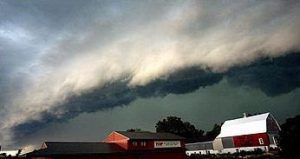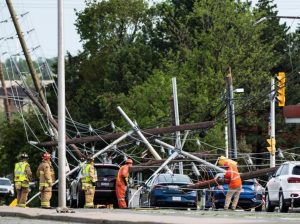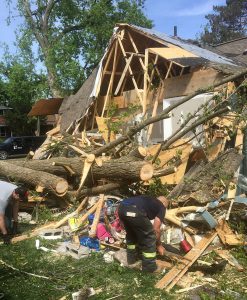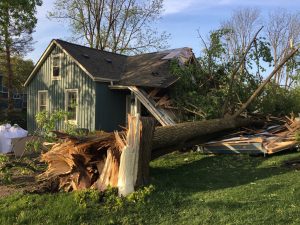
It came out of a conversation my daughter and I had a couple of months ago. Whitney explained that one of her children’s teachers had commented about a little-known after-effect of last year’s tornado. She said teachers at the public school from time to time have to calm down their young students when rain pelts the building’s roof or winds moan outside their classroom windows.
“Some of the kids react badly when stormy weather hits town,” she said. “And they wonder if we’re about to get hit by another tornado.”
I admit that many such winds and rainstorms over the eleven months since the derecho whipped through Uxbridge on May 21 last year, have given me pause.Instinctively when I hear or feel strong gusts, I look to the large limbs on some of the trees that are left in our yard and I scan the horizon to the west where the storm came from last year. And I dread any sky that hints at that ugly wine-bottle green colour that preceded the tornado.
As my daughter and I talked about such bad memories, we concluded that people in our community haven’t really had ample opportunity to tell their stories or experience full closure from the storm.

“We need to talk about it,” Whitney said. “We’re human. It’s what we do.”
In response, the Cosmos is inviting everyone to a town hall at 7 p.m. on Thursday, May 11, at the Seniors’ Centre on Marietta Street. As facilitator of the gathering, I’ve invited a number of friends and acquaintances who’ll share stories.
One of my guests will walk us through what some of our first responders faced that Saturday afternoon last May. Another guest from the town office will review what impact the storm had on township buildings and the challenges of getting things back up and running.
Perhaps most important, I’ve invited several friends and neighbours who sustained severe property damage and who’ve consequently faced tough decisions – decisions about rebuilding, restoring and recovering.

Among the toughest recoveries is that faced by the congregation of Trinity United Church. In a matter of seconds that Saturday afternoon last May, the storm tore the roof from the body of the church, leaving the sanctuary uninhabitable and its precious interior exposed to the elements.
Ultimately, church leaders had to forego any plan for restoration of what was. But all of us – churchgoers or not – were heartened by the show of support when another congregation brought prayer shawls and physical support to lift spirits of the Trinity family. Rev. Karen Hammond Croxall summed up feelings of loss this way:
“This continues to be a long road for our church and town,” she wrote last November. “Next week will be the demolition (of the church) and more tears. … It is similar to when you lose a person in your life – everyone grieves differently and the time frame is different.”

Rev. Croxall is absolutely right. Once we knew nobody had been killed during the fury of the derecho, we all began sorting through damaged possessions hoping for the best, prepared for the worst. I grieved over the smallest things – things lost in a car flattened by a fallen tree, newly acquired garden plants blown away, and tools lost that were passed down from our parents.
But mostly I grieved over the mature trees toppled or torn to pieces along our street; in one of my columns last May, I recalled my longtime neighbour Ronnie Egan (who died in 2016) enjoying the windbreak those trees provided in winter and the shade in summer.

“Sentries,” Ronnie said. “They’re like sentries up and down our street.”
And that’s another perspective I hope we’ll explore during our town hall on May 11. Uxbridge’s township canopy has always drawn praise for its diversity and resilience. It’s a subject I’ve often discussed with arborist Dave Watts as he’s attended trees in our yard over the past 30 years.
The storm, he told me, had an impact on his life he didn’t expect. When it hit, he was about to turn his tree service over to new owners.
“The storm delayed my retirement for two months,” he said. “More important, in the first few hours after the storm, we had over a hundred emergency calls – amongst the first, to clear entrances to Lakeridge and Bowmanville hospitals, several nursing homes and township roads.”
Perhaps Dave’s most remarkable story is where he was when the storm hit. And for that story, you’ll have to attend our town hall on Thursday, May 11, to find out.
All are welcome to come and listen or share a story.